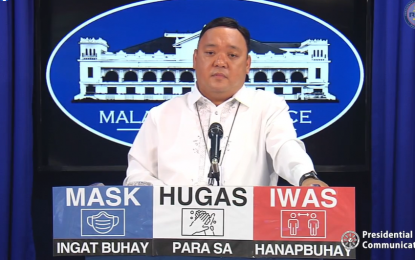
Presidential Spokesperson Harry Roque (File photo)
MANILA – The state-run Philippine Health Insurance Corp (PhilHealth) will compensate those who may experience adverse events following immunization (AEFI) for Covid-19 while a measure authorizing the creation and administration of an indemnification fund has yet to be passed, Malacañang said Monday.
This, after a House of Representatives panel approved the proposed Emergency Vaccine Procurement Act of 2021, which authorizes local government units (LGUs) to skip public bidding when buying Covid-19 vaccines.
The proposed measure also provides for the creation and administration of an indemnification fund for the AEFI.
“Well, the proposal pending also in Congress, it is the Philippine government that will compensate,” Presidential Spokesperson Harry Roque said in a Palace press briefing.
Roque said Health Secretary Francisco Duque III previously suggested putting PhilHealth in charge of compensation for the AEFIs.
“Ang obligasyon din natin ay dapat tayo rin po ang mag-compensate sa mga magkakaroon ng side effects at ang naging suhestiyon ng ating Secretary of Health ay ang PhilHealth ang magbabayad doon sa mga magkakaroon ng side effects (Our obligation is that we should compensate those who develop side effects and the suggestion of our Secretary of Health is that PhilHealth will compensate those who develop side effects),” he added.
He said he believes that the PhilHealth will be able to satisfy the conditions of drugmaker Pfizer and AstraZeneca requiring an indemnification fund for the AEFIs.
“I believe so kasi under Universal Health Care, the essence of Universal Health Care is we have single purchaser of all medical goods and services. So, pagdating sa side effects, siyempre ang magbibigay pa rin po ay ang PhilHealth (So, when it comes to side effects, of course the PhilHealth will compensate),” he said.
Dr. Ernesto Domingo, scientist and professor emeritus at the University of the Philippines College of Medicine, echoed Roque, saying adverse effects to vaccine could also be considered as an illness.
“Yes, it should be PhilHealth that should pay for this because once you react, that’s already an illness strictly speaking. Whether it came from vaccine or somewhere else is immaterial. What you need is support to get you out of the problem that resulted,” he said.
Meanwhile, Roque clarified the assumption that the lack of an indemnification fund was among the reasons for a delay in the arrival of vaccine supplies this month.
“They want the Philippine government just to sign an agreement clarifying who will assume obligation for indemnity. And under the Universal Health Care Law, it is the government through PhilHealth that will assume that,” he said.
Last week, Roque said President Rodrigo Duterte will sign an executive order (EO) allowing LGUs to purchase vaccines against Covid-19 sans going through the process of public bidding.
“Kung kinakailangang po, walang problema ‘yan dahil ang posisyon ni Presidente, kung kinakailangang i-issue iyan (If it’s really necessary, there will be no problem with that because the President’s stance is he will issue [an executive order] if need be),” he said.
At present, LGUs may purchase Covid-19 vaccines through tripartite agreements with the national government and vaccine manufacturers.
The government aims to vaccinate around 50 million to 70 million Filipinos this year. (PNA)
